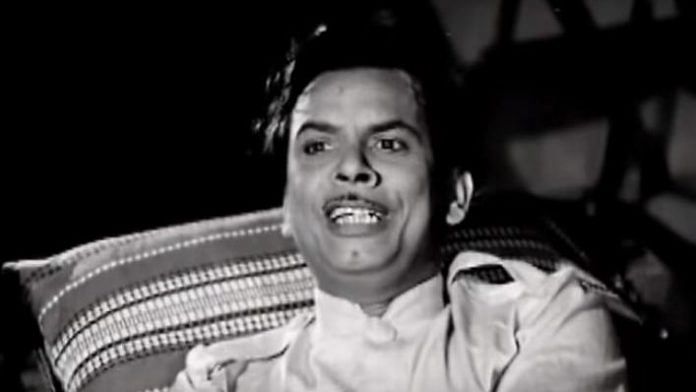New Delhi: Born Badruddin Jamaluddin Kazi, known and loved by generations of Indian filmgoers as Johnny Walker, the man with the magical comic timing had a story worthy of his own film.
He actually does have a film named after him, one of the few in which he played the leading man. But screen time was something that never affected Johnny Walker. He commanded a huge draw at the box office, with songs and roles created especially for him.
How ‘Johnny Walker’ came to be
Kazi was born in 1924 to a family of mill workers in Indore. When his father lost his job, the family moved to Mumbai. Kazi, who got a job as a BEST bus conductor, took it upon himself to entertain his passengers with his comical way of calling out bus stops, his hilarious impressions and tricks.
As fate would have had it, actor Balraj Sahni was once travelling in a BEST bus when Kazi was up to his goofy antics. An amused Sahni introduced him to actor and director Guru Dutt without the latter’s knowledge.
Actor Dev Anand and Dutt were in the midst of an intense discussion over their film Baazi (1951), when this ‘drunkard’ turned up on set. He tripped over every little thing and exaggerated every word, causing confusion and laughter. Out of nowhere, the drunkard straightened up, leaving others dumbfounded but Dutt fascinated. This episode bagged him his first break with Baazi.
Dutt was the one who named him Johnny Walker, because his slurry performances reminded Dutt of his favourite whiskey. Ironically, Kazi had never touched alcohol in his life.
It was on the set of Dutt’s films that Kazi got lucky again, when he met the love of his life, Noorjahan, younger sister of actor Shakeela. Like his career, his love story was also nothing short of filmy. Noorjahan’s parents were against the marriage, so she ran away from home. The nikah was solemnised at Kazi’s residence.
Also read: Remembering Guru Dutt, the genius filmmaker
An incredible journey
From his debut in Baazi to his last film, Chachi 420 (1997), Johnny Walker acted in over 300 films, including classics like Aar-Paar (1954), Taxi Driver (1954), Mr & Mrs 55 (1955), CID (1956), Pyaasa (1957), Naya Daur (1957), Kaagaz Ke Phool (1959), Mughal-e-Azam (1960) and Anand (1971).
Music was a major contributing factor to Walker’s success, and here, it’s important to note his collaboration with not just Dutt, but singer Mohd Rafi.
Rafi was the only singer who could modulate his voice to match the voice of the actor, and lent his voice to Walker for many a beloved tune. ‘Yeh Hai Bombay Meri Jaan‘ (CID) saw Walker impersonating a pickpocket sketching a poignant tale on the underbelly of Mumbai, while ‘Jaane Kahan Mera Jigar Gaya Ji‘ (Mr & Mrs 55) portrayed Walker as a hilariously confused lover looking for his heart under the table. And then, of course, there was his iconic ‘champiwala‘ turn in Pyaasa, with ‘Sar Jo Tera Chakraye‘.
The audiences adored his presence on screen, his unconventional facial features, his unique diction that made him the perfect fit for a drunk character.
Kazi was the quintessential everyman, on and off screen. His daughter, Tasneem Khan recalled her father saying “I’ve reached the peak. Mount Everest chadh chukka. Utarna bhi hai na. Ghar hai, car hai, bacche hai, telephone hai, aur kya chahiye? (I’ve reached Mount Everest. Now I’ve to climb down. I’ve a house, a car, children, telephone… What else do I need?)”
His comedy didn’t take away the seriousness of his message, if there was one. He used comedy to talk about a range of social issues. His flirtatious impressions, for instance, as ‘CID’ in Baat Ek Raat Ki (1962) put into perspective the nature of narratives that women were exposed to in those times.
He prided himself on “clean comedy”, and when stars like Mehmood overtook the comedy scene in Bollywood, he went on record to say that “we were aware that the person who had come to the cinema had come with his wife and children. The comedian has ceased to be a character, he’s becoming something to fit in between scenes. I opted out because comedy had become hostage to vulgarity”.
Also read: Comedy king Mehmood who earned more than the lead actors of his films




Great comedian. His role in Anand with Rajesh Khanna.. hasaake… hasaake.. rulaadegaa..